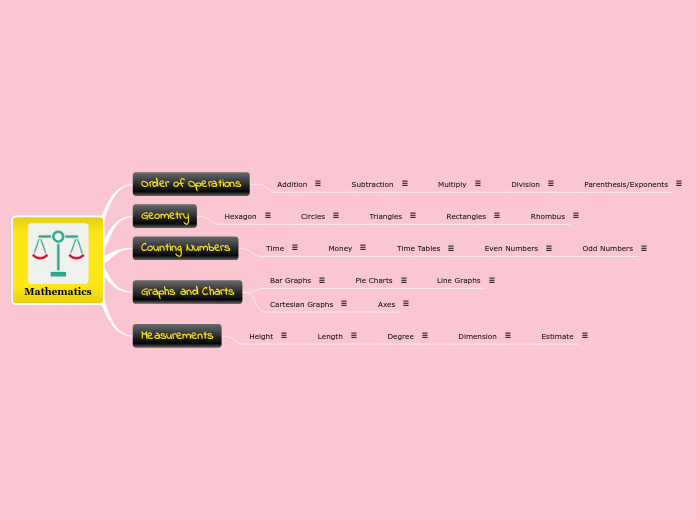
Mathematics
Order of Operations
Addition
Has a problem and solution.Tells how 2 groups joined togetherPlus
Subtraction
Subtract money in order to figure out how much change you should get back when you buy something.Figuring out how long someone in history lived by subtracting the year they were born from the year they died.
Multiply
Multiply measurements to know the area of a floor in order to put carpeting in.Multiply numbers to help you figure out how much 30% off an item is.
Division
Divide how many points you have earned by the number of possible points to calculate your grade in a class.
Parenthesis/Exponents
In Order of Operations "PEMDAS", it is a must you complete what is in the parenthesis and/or exponents first.
Geometry
Hexagon
Hexagon is a six-sided polygon or 6-gon.
Circles
A circle is measured by its circumference, diameter, and radius. A closed shape.
Triangles
A triangle is a specific part of two dimensional space. It has three straight sides and three vertices.
Rectangles
A four-sided shape with all right angles.
Rhombus
A rhombus is a four-sided shape where all sides have equal length. Also opposite sides are parallel and opposite angles are equal.
Counting Numbers
Time
Learn how a clock is dividedUse the little hand to read the hourUse the big hand to read the minutesPut these together to get the timeDifferentiate between AM and PM
Money
Counting money is an important skill you will use in everyday life. You will need to know how much the different coins and bills are worth and how to add. Value of CoinsPenny (1 cent)Nickel (5 cents)Dime (10 cents)Quarter (25 cents)Value of Bills1 dollar bill5 dollar bill10 dollar bill20 dollar billWhen you add coins you add the cents. Every 100 cents is 1 dollar.
Time Tables
Used to define a multiplication operation for an algebraic system.
Even Numbers
An even number is an integer which is evenly divisible by two. If the integer is divided by 2, it yields no remainder.Ex. 2,4,6,8,10,12.....
Odd Numbers
Odd numbers cannot be divided evenly into groups of two. Ex. 1,3,5,7,9,11,13.....
Graphs and Charts
Bar Graphs
Bar graphs generally have categories on the x-axis, and numbers on the y-axis. The categories need to be independent, that is changes in one of them do not affect the others.
Pie Charts
A pie chart looks like a circle or a pie, cut up into segments. Pie charts are used to show how the whole breaks down into parts.
Line Graphs
Line graphs are usually used to show dependent data, and particularly trends over time.
Cartesian Graphs
Cartesian graphs compare two sets of numbers, one of which is plotted on the x-axis and one on the y-axis.
Axes
Graphs have two axes.x-axis(horizontal), may contain categories or numbers.y-axis(vertical), usually contains numbers.
Measurements
Height
The measurement of the vertical distance.
Length
A measurement of distance.
Degree
A unit of measure used for angles.
Dimension
In measurement, the dimensions are represented by length, width, and height.
Estimate
When guessing a measurement close to the exact measurement.
